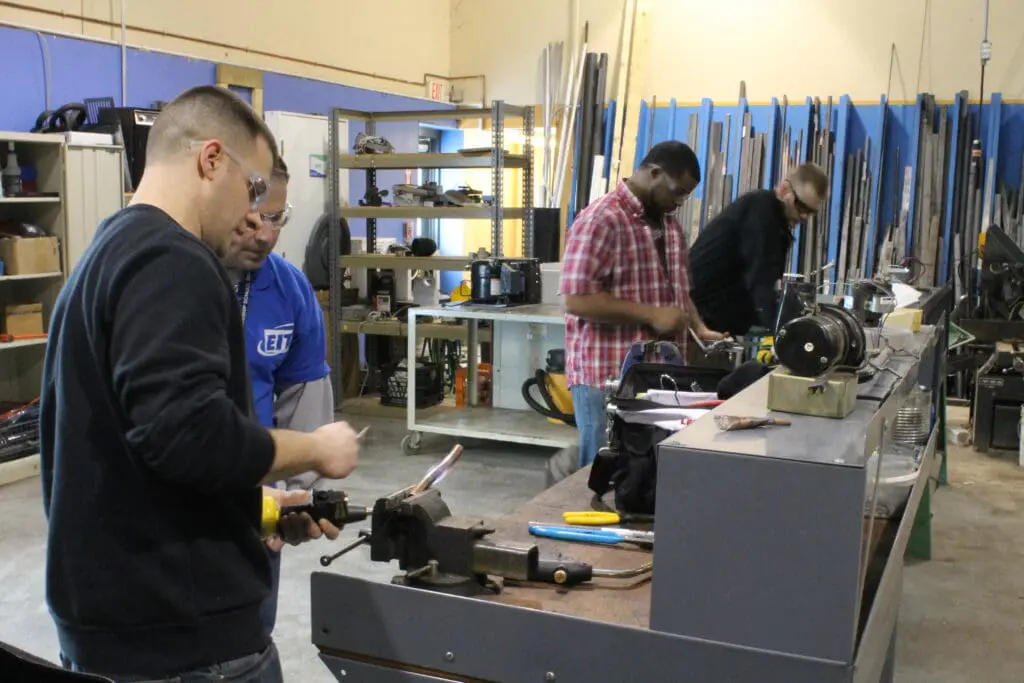Thinking about becoming an HVAC technician? Good for you! Learning a trade of any kind is a great investment in your professional life. Plus, HVAC technicians have opportunities to develop specialized skills that will always be in demand.
As homeowners’ saving grace when their major appliances fail, HVAC technicians must know how to repair and install everything from furnaces and air conditioners to hot water tanks and refrigeration systems.
As you can imagine, it’s not an easy job.
Luckily, there are tools they can add to their arsenal to make this difficult work a little more manageable. In the following article, we’ll explain what HVAC technicians do and review the tools they use to do it.
What Does an HVAC Technician Do?
If you’re here, you probably already know that HVAC stands for heating, ventilation, and air conditioning. HVAC technicians are the trained professionals responsible for installing, maintaining, and repairing these types of systems in our homes, businesses, and other facilities. They diagnose and fix problems related to indoor air. Even better, they perform preventive care to keep these problems from happening in the first place.
On any given day, an HVAC tech might find himself or herself:
- Installing a brand-new, energy-efficient heating system in a newly built home
- Troubleshooting a malfunctioning air conditioner in a busy office building
- Performing routine maintenance on a complex ventilation system in a hospital
- Retrofitting an old building with a modern, eco-friendly climate control setup
These tasks require a diverse skill set. HVAC techs need to be part electrician, part plumber, and part refrigeration expert. They work with an array of systems — from traditional furnaces and air conditioners to cutting-edge heat pumps and solar heating systems. When fixing this often complex machinery, they must also work with an assortment of tools.
HVAC Tools Every Tech Must Have
Depending on their skill level or career stage, HVAC technicians employ various types of tools on the job. In the following section, we’ll categorize these tools by skill level, providing brief overviews of each.
Beginner HVAC Tools List
Beginner HVAC technicians will want to keep a compact yet durable tool bag on their person so that basic HVAC tools are within reach at all times. These basic tools should include:
- Screwdriver set – flatheads and Phillips screwdrivers install and remove screws in hard-to-reach places like thermostat components
- Adjustable pipe wrench – for gripping and turning pipes and fittings
- Hammer – for general striking and prying tasks
- Drill – for drilling holes and driving screws without stripping them
- Level – ensures proper alignment of equipment and finished work
- Service wrench – for tightening or loosening different-shaped screws, these are especially good for accessing refrigeration valves
- Fuse puller – safely removes fuses from electrical systems
- Needle nose pliers – for gripping and manipulating small objects or wires
- Hand seamers – also known as sheet metal hand brakes, these are used to flatten, bend, or fold sheet metal
Jumpstart Your HVAC/R Career Today!
Gain hands-on experience with cutting-edge HVAC/R systems and prepare for a high-demand career with expert-led training.
HVAC Specialty Tools
- Handheld thermometer – digital models accurately measure temperatures in various parts of the HVAC system
- Multimeter – tests electrical circuits and components for safety and functionality
- Digital refrigerant gauges – measure refrigerant pressure and calculate system parameters
- Coil fin straightener – repairs bent or damaged fins on heat exchangers
- Core removal tool – extracts valve cores from air conditioning and refrigeration units
- Thermal imaging tools – specialized cameras and readers detect temperature variations to diagnose system issues
- HVAC data logger – when looking to improve indoor air quality or energy efficiency, these devices can be used to collect diagnostic data over time to monitor the performance of HVAC systems
- Psychrometer – measures relative humidity and other air properties such as airflow and air mixture
Some Other Essential HVAC Tools
- Cutters – from tube and pipe cutters to sheet metal shears, you never know what you might need to slice or sever (a basic utility knife or box knife can also be useful for cutting insulation and opening packages)
- Sawzall – incorporates a specialized reciprocating saw blade to cut through various materials quickly
- Extension cords – use these extended cords to keep electronic equipment powered from other rooms
- Ear protection – disposable or reusable ear plugs will protect your hearing when working around noisy machinery
- Gloves – available in varying thicknesses, gloves shield hands from chemicals and sharp objects
- Safety glasses – specially configured goggles protect eyes from debris and chemicals
HVAC Technician Careers are in Demand
As we pointed out earlier, HVAC technicians are more in demand than ever. With increased attention to renewable energy and a greater concern for indoor air quality, the US Bureau of Labor Statistics (BLS) projects a 6% increase in job growth for HVAC-related careers between 2022 and 2032.
Most HVAC technicians learn through formal apprenticeship programs, training in the field, or programs offered through various community colleges or trade schools. They need to obtain certain licenses and certifications to get employed, with continuous training required to maintain employment.
HVAC technicians work in a variety of different job sites and environments including schools, hospitals, private homes, and other public facilities. Their day-to-day work is generally comprised of manual labor. They may frequently work indoors or outdoors in areas with poor ventilation, confined spaces, or extreme temperatures. As of 2023, the BLS reports a median annual wage for HVAC mechanics and installers of $57,000.
Become a Certified HVAC Technician
Now that you’ve learned about the tangible tools required to be an HVAC technician, are you ready to acquire the mental tools?
In just four terms, the Erie Institute of Technology’s HVAC/R Technology career training program can help you gain the skills and knowledge needed to excel in this in-demand field. Our program is designed to give you a competitive edge in the job market.
Here’s what you can expect:
1. Hands-on Training: Get practical experience with real HVAC systems, preparing you for the challenges you’ll face on the job.
2. Comprehensive Curriculum: Learn everything from installation and maintenance to repair of both electronic and mechanical components of HVAC systems.
3. Diverse Skill Set: Develop expertise in:
- Installing HVAC units and their components
- Ductwork installation, including flexible tubing and sheet metal work
- Installing and repairing fuel and water supply lines
- Proper handling and recycling of refrigerants
- Electrical connections for HVAC components
- HVAC system automation
4. Quick Completion: Finish your training in as little as one year, fast-tracking your path to a new career.
5. Industry-Ready Skills: Upon graduation, you’ll be prepared to install, maintain, and repair the complex systems that keep our indoor environments comfortable and energy efficient.
Are you interested in starting a career as an HVAC technician? Contact us to learn more about the program, or enroll today.
About Author:

Ross Aresco
CFO
Ross Aresco is the CFO of Erie Institute of Technology. Erie Institute of Technology (EIT) is an Erie Pennsylvania technical/trade school providing training programs for medical, computer, electronics, manufacturing, and technology careers. EIT offers programs in many different areas to suit your interests and talents.

